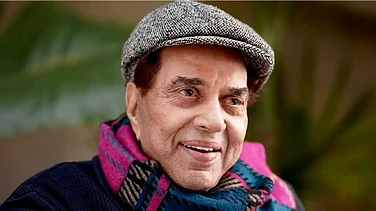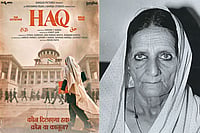There is a morbidly funny scene in the small, troubling Georgian film Wet Sand (2021), set in a parochial seaside small town, where old Eliko, whom the others see as an outsider, as snooty and aloof, has quietly hanged himself. After a lot of bickering, the townspeople reluctantly get together to arrange his funeral. As they lower Eliko’s coffin into the grave, it wouldn’t fit. It falls vertical into the pit. Have the grave diggers, men from the community, deliberately left it short to humiliate Eliko even in his death or is it an oversight? Many of those gathered don’t have the patience to wait till the grave is broadened and they start to leave the funeral.
This is even before the villagers know Eliko was gay.

Only Amnon, who runs the town’s café Wet Sand, attired in his best suit is there till the end. Amnon (a brilliant, restrained Gia Agumava) and Eliko have been secret lovers for over twenty years. In a moving scene, he opens up to Eliko’s granddaughter Moe, a rebel and free-spirit (a kickass Bebe Sesitashvili in short, streaked hair and piercing look) who has come to the town from the capital Tbilisi for Eliko’s funeral.
Wet Sand directed by Elene Naveriani slowly and deliberately unleashes the hate that ‘normal people’ have for anyone who is the ‘other’—the outsider, the homosexuals, the non-conformists. It tries to understand why otherwise regular folk, seemingly warm and sensitive, who drink and dance and dine, have demons in their hearts. The small seaside town in faraway Georgia is a microcosm of the intolerance, of the hatred, of the distrust among people that is poisoning many societies around the world.
The mesmerising The Portrait of a Lady on Fire (2019) by French auteur Celene Sciamma is also set on a faraway shore in 18th century France. But there are no people on the island, there is nobody else except the four characters, all women, around whom the story revolves. There is a hush, a silence in the film, the kind that can descend on a seashore even though there is the constant lashing of the waves.
Marianne, a budding artist and daughter of a famous painter is commissioned to draw the portrait of a young aristocratic girl Heloise who is to be married off to a nobleman soon, much against her will. But Marianne has to do Heloise’s portrait secretly (she has been brought to the island on the pretext of being Heloise’s walking companion) as she refuses to be painted. This gives Sciamma the cue for a long, lingering gaze at her characters. The filmmaker has said Portrait of a Lady on Fire is ‘a manifesto of the female gaze’. Marianne has to furtively look hard at her subject while they are walking, to memorise every contour, every nerve, every hair of her body to go back and paint later.

At first, Heloise is difficult (her elder sister, who was to have married the same nobleman, has recently fallen off the cliffs to her death), she is sullen and irascible but as Marianne starts to get to know her, her vulnerability and fears show up. Adele Haenel is riveting as Heloise, she visibly melts before our eyes from being an irate ice maiden in the beginning to a warm and glowing girl later in the film. Noemie Merlant as Marianne matches her in every step, her innate charm and honesty, as also a brittleness just under her practical self, makes it difficult to take your eyes off her when she’s on-screen.
It is not long before they are madly, passionately, and in their minds sinfully, in love with each other. Heloise has now found out that Marianne is a painter and agrees to post for her portrait. The viewer can feel the growing intimacy between them, their stolen stares and their caresses, their skin glowing in the warm candlelight. There are a few scenes of their physical relationship, of them, lying in bed together in casual chatter, but Sciamma lets the viewer smell the room they are in through the crumpled sheets, their dishevelled hair, and their flushed faces.
The other woman in the house is the maid Sophie, even younger than Heloise and Marianne, serving them their meals and making their beds. In an intense sequence, Sophie has to go to the village quack for an abortion. After the painful ordeal, Heloise and Marianne look after her, cook for her and soothe her as she sits by the burning fire knitting. All class barriers have dropped, they are just three girls, taking care of each other.
Also Read | 'Indian Society Lacks Acceptance For LGBTQ+ People Despite Decriminalisation'
This idyll of course cannot last. It’s the 18th century and a lesbian relationship has no future, it has to end in tears, in loss and suffering, as it has to in most countries in the world in 2022. This brief interlude in the remote island is like a dream for Heloise and Marianne, who will soon be dragged to the real world, to get married and produce children, to struggle to be a woman painter, to conform and bow to rules set by men.
The arresting Noemie Merlant is also in Jacques Audiard’s Paris, 13th District (2021), luminous and lush in black and white (a Paris film without a single shot of the Eiffel Tower, a temptation that even a Goddard or Truffaut couldn’t resist!). The film is about heterosexual millenials, all grappling with relationships and co-existing, but Merlant’s character Nora has a brush with Amber Sweet, a camgirl on a pornographic site who looks like her. On a whim, Nora contacts Amber and they get chatting, Amber’s meter ticking by the minute. The chats get longer, Amber shuts off the meter, they develop a loveship, letting into each other’s secrets, their hopes and fears, and they fix up to meet in real. It’s one of the most exhilarating moments in the film, with both Nora and Amber fighting back tears, as are most watching them. They want to touch and feel, to see if both of them exist in real or if they are just apparitions on device screens.

But much before smartphones and laptops, the macho Phil Burbank (Benedict Cumberbatch) wants to touch and feel his mentor and lover Branco Henry which remains unfulfilled in a Montana ranch in 1925 in Jane Campion’s Power of the Dog. Her film is reminiscent of the poignant and visceral Brokeback Mountain (2005) all those years ago, of the doomed love story of two cowboys Heath Ledger and Jake Gyllenhall directed by Ang Lee based on a short story by Annie Proulx. Campion’s film is more sweeping, Phil’s secret and unrequited love for his hero is only one strand, but it explores the stereotype of tough men in rugged surroundings, what they are supposed to feel and do, and how it is unthinkable for the people around them that men could be attracted to one another.
Set over 50 years later, in the 1980’s Italy countryside, the lyrical and heartbreaking Call Me By Your Name has the teenager Elio and a little older American graduate Oliver falling wildly in love. The coming-of-age film captures the confusion in the young men’s mind, the fear of going against society’s norms, the force of love and the grief of the inevitable separation is caught by Italian filmmaker Luca Guadagino in small, detailed vignettes. In the beginning, Elio, a reserved, bookish boy, happy to hang out with his friends is repelled by Oliver’s advances. The film builds their attraction, scene-by-scene, in little conversations and togetherness, while on a hike to a mountaintop or swimming in the river, their desire exploding in a frenzy when they go to visit the nearby town for a few days. But all the while there is a hanging melancholia as Elio and Oliver, and the viewer, know their love has no future, Oliver will be married soon and the perhaps the few days they spend together in the little, sunny Italian village will be the most passionate of their lives.























